Uncover the hidden layers behind the Bible's 'begats,' revealing a tapestry of history, prophecy, and faith awaiting exploration.
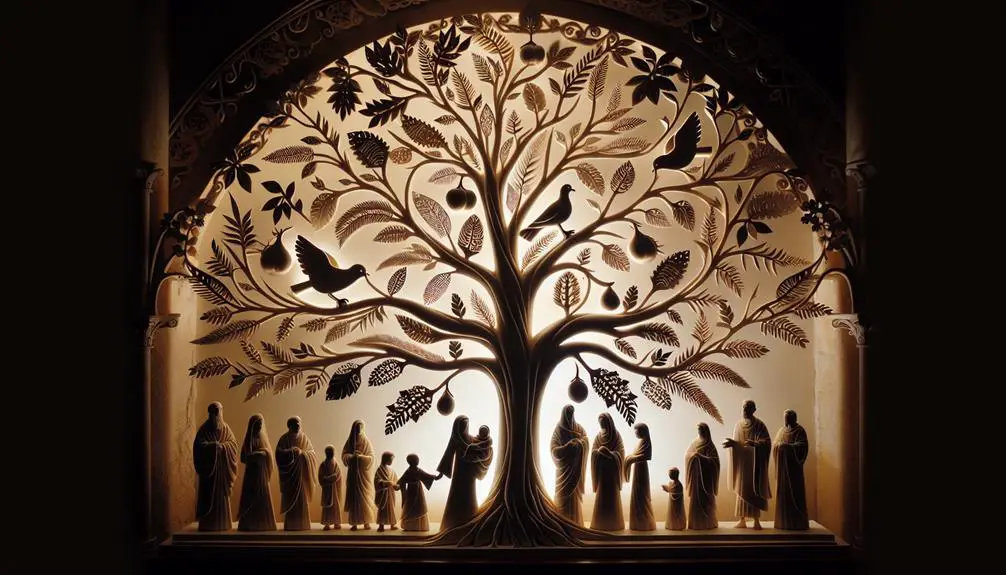
Begets in the Bible
Just as the roots of a mighty oak trace back through a complex web of earth and time, the genealogies in the Bible weave a narrative that stretches from the dawn of creation to the birth of Christ.
You've likely skimmed over the 'begats' without giving them much thought, but there's a wealth of history and prophecy nestled within these seemingly dry lists.
From Adam to Noah, through Abraham, and down to David and Jesus, each name carries stories of faith, lessons in morality, and glimpses of God's overarching plan.
Unearthing the significance of these lineages offers insights into the cultural and theological underpinnings of the Bible, inviting you to explore deeper connections that might just change the way you view this ancient text.
Key Takeaways
- 'Beget' in the Bible often refers to the act of fathering children and symbolizes the continuation of lineage and beliefs.
- Biblical genealogies serve to preserve cultural heritage, offer theological insights, and clarify historical lineages.
- The genealogies in the Bible, including those of key figures like Abraham and David, highlight divine intervention and the fulfillment of prophecy.
- Understanding 'begets' and genealogies in the Bible provides deeper insights into the cultural and theological significance of biblical narratives.
Understanding 'Beget' in Context

To fully grasp the meaning of 'beget' within the biblical context, it's essential to examine its usage across various passages and interpretations. You'll find that 'beget' primarily denotes the act of fathering children, underscoring patrilineal descent. This term's significance, however, extends beyond mere reproduction, hinting at the perpetuation of values, beliefs, and societal roles.
Delving into linguistic evolution reveals how 'beget' has morphed in usage over time. Originally, in ancient texts, it carried a straightforward biological implication. Yet, as language evolved, so did the word's connotations. Today, you might encounter 'beget' in discussions about origins and causes, illustrating its broader application in modern lexicon.
Modern parallels further enrich your understanding. Consider how 'beget' in contemporary contexts often signifies generating outcomes or results, not just offspring. This shift in meaning reflects society's focus on legacy and impact rather than solely on lineage.
The Significance of Genealogies
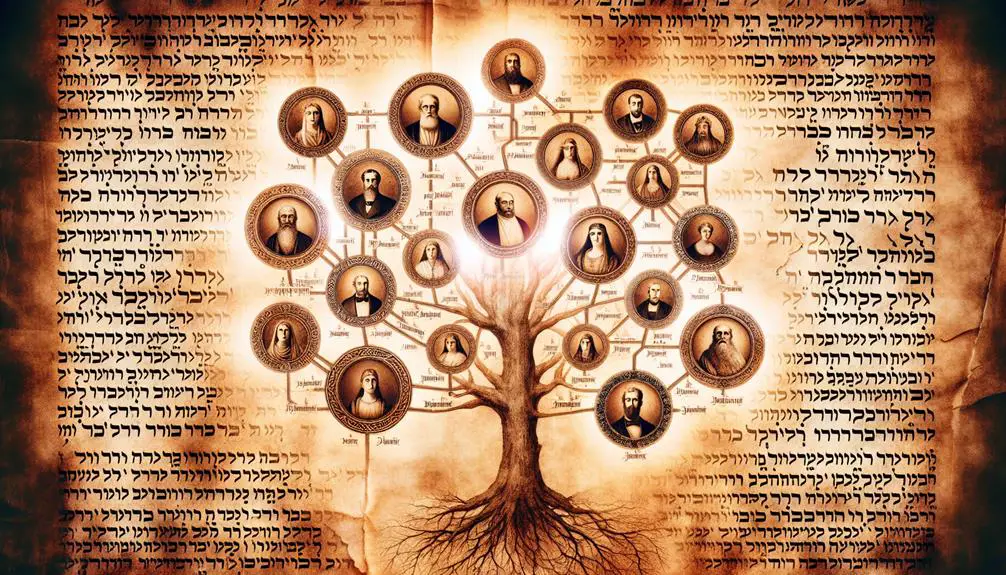
You must understand that genealogies in the Bible aren't mere lists of names; they serve as vital links to cultural heritage preservation. They offer theological insights, unveiling the depth of divine relationships and promises throughout biblical history.
Furthermore, they clarify historical lineages, providing a structured framework to comprehend the interconnectedness of biblical figures and events.
Cultural Heritage Preservation
Understanding the genealogies within the Bible sheds light on the importance of preserving cultural heritage, emphasizing how societies value lineage and history. This reverence underscores the need for meticulous methods such as digital archiving and art restoration.
Digital archiving offers a way to safeguard ancient texts, ensuring that future generations have access to these invaluable records. Similarly, art restoration plays a critical role in preserving visual representations of genealogical records, often found in historical artifacts and religious icons.
Theological Insights Unveiled
Beyond preserving our past, examining biblical genealogies offers profound theological insights, revealing how lineage and history shape our understanding of faith and spirituality.
Aspect |
Insight |
Impact on Belief |
|---|---|---|
Modern Interpretations |
Recontextualizes ancient narratives |
Deepens spiritual engagement |
Genealogical Discrepancies |
Challenges to reconcile differences |
Encourages critical reflection |
Divine Purpose |
Highlights God's plan through generations |
Strengthens faith in divine guidance |
Covenant Relationships |
Shows God's promises through lineages |
Enhances understanding of divine promises |
Moral Lessons |
Teaches values through ancestral stories |
Guides moral and ethical behavior |
These genealogies aren't just lists; they're a bridge connecting you to the theological roots and the evolving interpretations that shape today's faith practices. They invite you to explore deeper, reflecting on the intricate tapestry of human and divine interaction recorded in the Bible.
Historical Lineages Clarified
Delving into biblical genealogies unveils the intricate historical lineages that have shaped religious narratives and beliefs through centuries. When you examine these genealogies closely, you're not just tracing ancestry; you're uncovering the roots of faith and identity.
The accuracy of these lineages is bolstered by:
- Dating methods that pinpoint the era of key figures.
- Archaeological evidence supporting the existence of these individuals.
- Cross-referencing with historical texts to ensure consistency.
This analytical approach ensures that the genealogies aren't merely taken at face value but are scrutinized and understood in the context of historical accuracy. It's a methodical examination that strengthens the bridge between faith and historical fact, offering you a deeper appreciation of the biblical narratives.
Adam to Noah: The First Lineages
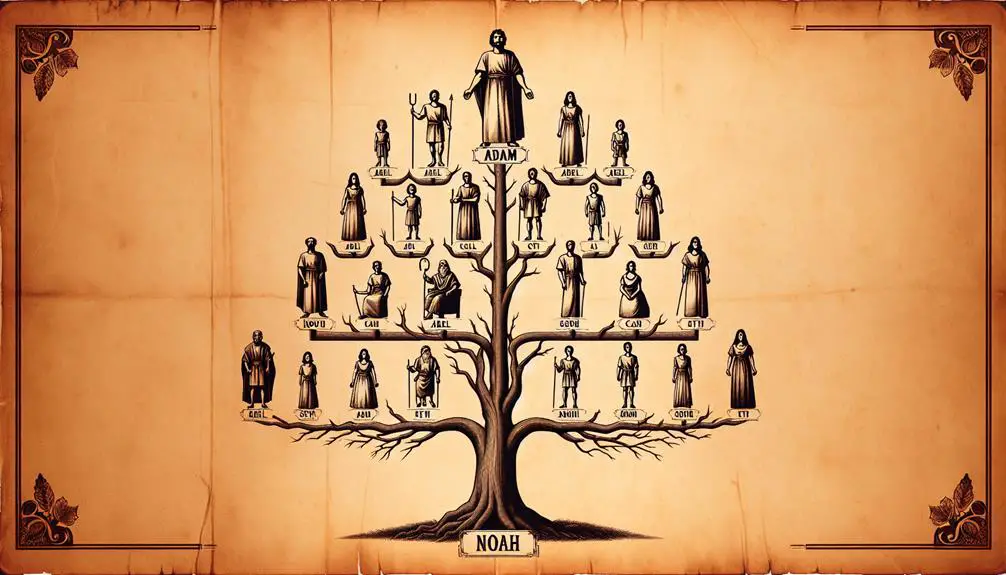
From Adam to Noah, the Bible delineates the earliest lineages, tracing humanity's origins through a series of begets that underscore both divine intent and human unfolding. This genealogical record isn't just a list; it's a rich tapestry that hints at broader themes, including genetic implications and lifespan discussions.
You're entering a narrative that meticulously charts the path from the first man to the architect of the ark. This journey isn't merely historical; it's foundational, shedding light on the human condition and its divine orchestration. As you delve into these lineages, you'll encounter extraordinary lifespans that provoke thought and debate. What were the genetic implications of these extended years? How did they shape the early human experience and the stories passed down through generations?
Ancestor |
Lifespan (Years) |
|---|---|
Adam |
930 |
Seth |
912 |
Enosh |
905 |
Noah |
950 |
This table isn't just a collection of numbers; it's a window into a world where longevity was the norm, not the exception. These lifespans invite you to ponder the nature of early human existence and the factors that may have contributed to such prolonged lifetimes.
Analyzing these lineages also brings to the forefront discussions on genetic implications. How did these early ancestors influence the genetic makeup of their descendants? What can their lifespans tell us about the health, environment, and societal structures of the time?
As you explore the lineage from Adam to Noah, you're not just tracing a line of descent. You're piecing together a puzzle that spans the realms of biology, theology, and history, offering insights into the dawn of humanity.
From Noah to Abraham: Key Transitions

You'll find that the journey from Noah to Abraham encapsulates pivotal moments in biblical history.
Starting with Noah's sons' lineage, we trace humanity's spread and diversification post-flood, setting the stage for the Tower of Babel incident, which illustrates the fragmentation of human unity.
Lastly, Abraham's divine call marks a significant shift towards monotheism and establishes a covenantal relationship that shapes the rest of biblical narrative.
Noah's Sons' Lineage
Tracing Noah's lineage reveals a pivotal transition, as it connects the post-Flood world to the patriarch Abraham through a series of genealogical steps. In the aftermath of the Flood, Noah's role was crucial, not just for his ark construction but for the lineage that would emerge from his sons. This lineage is vital for understanding the biblical narrative's continuity and the establishment of nations.
To evoke emotion, consider these aspects:
- The resilience in the face of the Flood's devastation.
- The hope symbolized by the ark's construction.
- The promise of a new beginning through Noah's descendants.
Analyzing Noah's sons' lineage uncovers a methodical progression from one pivotal era to another, bridging the gap between the cataclysmic Flood and the emergence of Abraham, a key figure in the biblical story.
Tower of Babel Incident
Exploring the period following Noah's lineage, we encounter the Tower of Babel incident, a pivotal moment that further shapes the biblical narrative leading up to Abraham. This event underscores humanity's architectural ambition, showcasing an attempt to build a tower reaching the heavens. The endeavor, driven by a desire for unity and fame, ultimately leads to unforeseen consequences.
God's intervention introduces language diversity, dispersing people across the earth and halting the construction. This act of divine intervention not only demonstrates the limits of human ambition but also sets the stage for the emergence of varied cultures and languages.
The Tower of Babel incident marks a significant transition in the biblical story, emphasizing the complexities of human endeavors and divine will, intricately weaving these themes into the fabric of biblical history.
Abraham's Divine Call
In the continuum of biblical narratives, Abraham's divine call represents a critical juncture, signaling a shift from collective endeavors to individual faith and obedience. This transformation isn't merely historical; it's foundational, shaping the trajectory of faith communities and their understanding of divine interaction.
Modern interpretations of Abraham's journey often highlight:
- The leap of faith required to leave everything familiar behind.
- The resilience in facing nomadic challenges, underscoring a trust in divine provision.
- The personal relationship with God, setting a precedent for individual faith.
Analyzing Abraham's call, you're compelled to consider the intricate balance between divine command and human action. This narrative invites a methodical reflection on how faith is lived out amidst uncertainty, urging an exploration of how these ancient lessons resonate today.
The Line of David: A Royal Genealogy
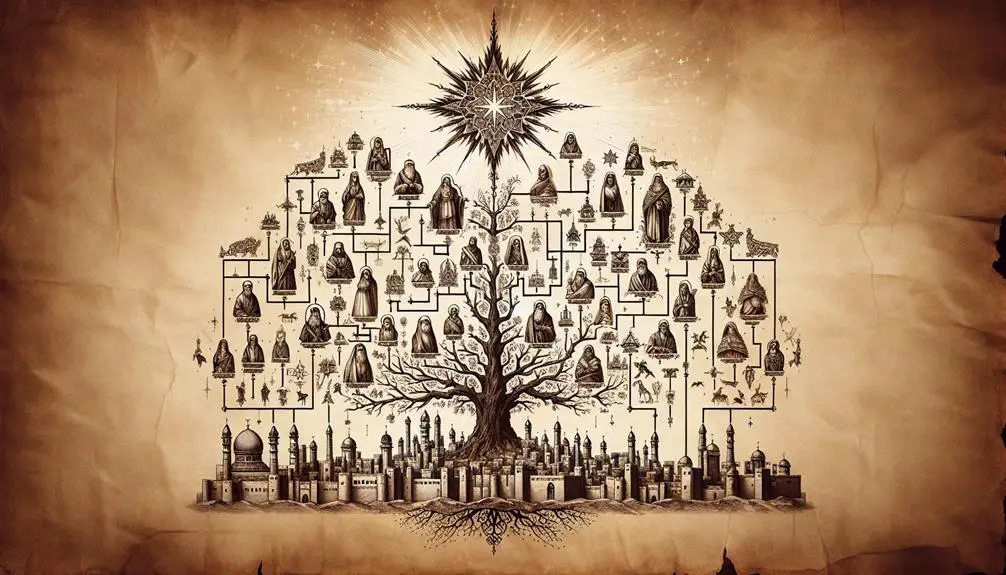
David's lineage, a pivotal element in biblical genealogy, exemplifies the continuity of royal heritage through generations. Starting with his unexpected ascent from shepherd boy to the anointed king, David's story is deeply intertwined with King Saul's role. Saul's initial favor and subsequent envy set the stage for David's rise, showcasing the divine hand guiding the succession of Israel's kingship. David's establishment of a royal dynasty marks a significant juncture, emphasizing God's covenant with him, promising that his house and kingdom would endure forever.
The narrative deepens with Solomon, David's son, known for his unparalleled wisdom. Solomon's ascension to the throne wasn't just a testament to his intellectual acumen but also fulfilled the divine promise made to David. His reign symbolized the zenith of Israel's monarchy, characterized by peace, prosperity, and the construction of the Temple in Jerusalem. Solomon's wisdom, while bringing internal stability and international renown, also laid the groundwork for understanding the complexities of leadership and the importance of discernment, themes that resonate through David's lineage.
Analyzing David's genealogy, you'll notice a pattern of divine intervention, complex human relationships, and the fulfillment of God's promises. Each successor, from Solomon onwards, carried forward David's legacy, albeit with varying degrees of faithfulness and success. This lineage isn't just a historical record; it's a testament to the enduring nature of God's covenant with David, shaping the identity and destiny of the Israelite nation.
Jesus' Genealogy: Fulfilling Prophecy
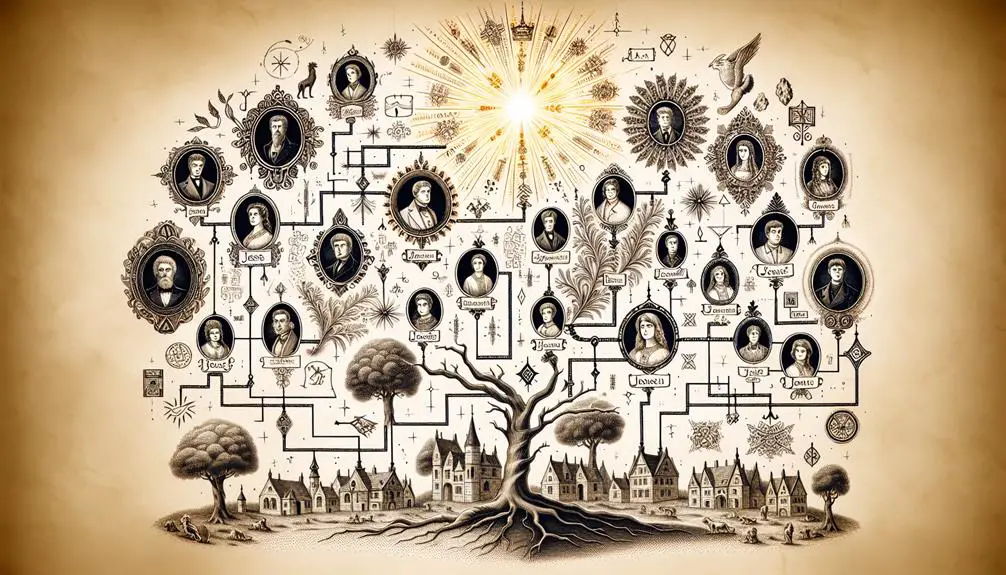
Tracing Jesus' genealogy reveals a meticulously orchestrated fulfillment of ancient prophecies, firmly anchoring Him within David's royal lineage. This connection isn't just a matter of historical record; it's a profound testament to the deliberate nature of biblical narratives, intertwining the miraculous with the earthly, the divine with human history.
- The Miraculous Conception: At the heart of Jesus' genealogy is the miraculous conception, a cornerstone that defies natural law and signals the inception of a new era. This event alone challenges the norms of genealogical record-keeping, presenting Jesus as both fully human, through His Davidic lineage, and fully divine, born of the Virgin Mary. This duality fulfills the prophecy of Isaiah, emphasizing the supernatural aspect of His birth and mission.
- The Political Context: The genealogy of Jesus also navigates the treacherous waters of the political context of the time. By establishing Jesus as a descendant of David, the narrative asserts a legal and legitimate claim to the throne of Israel. This claim, however, isn't to incite political upheaval but to fulfill a spiritual kingship, reshaping the expectations of the Messiah.
- The Fulfillment of Prophecy: Through meticulous genealogical record, the lineage of Jesus accomplishes what centuries of prophecy foretold. It doesn't merely trace His ancestry; it validates His messianic identity and mission.
Analyzing Jesus' genealogy, therefore, isn't just an exercise in historical curiosity. It's a journey through a landscape where divine prophecy, miraculous events, and the complex political context of ancient Judea converge, affirming Jesus' place in the sacred narrative.
Cultural and Theological Implications
Jesus' genealogy doesn't just map His earthly lineage; it also weaves a rich tapestry of cultural and theological implications, shaping the beliefs and traditions of countless generations. This lineage, as recorded in the Bible, serves not only as a historical account but also as a profound statement on the nature of divine fulfillment and human interconnectedness. It's crucial to delve into the layers of meaning that these genealogies impart, particularly in the context of modern interpretations and genealogical controversies.
Modern interpretations of Jesus' genealogy often highlight the inclusivity and universality of His message. By tracing His lineage through a variety of figures, some of whom were outsiders or had questionable pasts, the Bible reinforces the idea that grace and salvation are accessible to all. This challenges readers to reconsider their own perspectives on ancestry and worthiness, encouraging a more accepting and comprehensive understanding of community and faith.
Furthermore, genealogical controversies, such as discrepancies between different accounts of Jesus' lineage, prompt rigorous theological and historical analysis. These debates aren't merely academic; they're integral to understanding how traditions and teachings have evolved. They also underscore the complexity of biblical texts, reminding you that these documents are products of their time, subject to the interpretations and biases of their authors.
In examining Jesus' genealogy, you're invited to explore not just the roots of Christian belief but also the dynamic interplay between history, culture, and theology. This exploration enriches your grasp of the Bible's enduring influence, demonstrating how ancient texts continue to inform and shape modern spiritual lives.
Frequently Asked Questions
How Does the Concept of "Begetting" in the Bible Relate to Modern Discussions on Gender Roles and Paternity?
When discussing modern gender roles and paternity, the biblical concept of 'begetting' takes on new dimensions.
You'll find that genetic testing and legal adoption significantly alter traditional views.
Genetic testing challenges the notion of paternity by providing undeniable proof of biological lineage, while legal adoption expands the definition of parenthood beyond biological ties.
These developments encourage a more inclusive understanding of family structures, shifting the focus from biological connections to emotional and social bonds.
Are There Any Notable Differences in the Portrayal of "Begetting" Across Different Bible Translations and Why?
You might think translation nuances don't matter, but when it comes to interpreting ancient texts, they're crucial.
Different Bible translations showcase notable differences in 'begetting' due to translation accuracy and linguistic evolution.
This isn't just about old words; it's how shifts in language reflect our understanding of lineage and identity.
Analyzing these variations methodically reveals the impact of linguistic choices on our perception of historical narratives, making your reading both more informed and insightful.
How Have Interpretations of "Begetting" in the Bible Influenced Contemporary Religious Practices or Beliefs About Lineage and Inheritance?
Interpretations of lineage and inheritance in religious texts have shaped modern beliefs and practices significantly. You'll find that genealogical pride and a quest for religious legitimacy drive many contemporary faith communities.
This stems from how foundational texts address lineage, influencing views on heritage and rightful leadership. It's fascinating to see how ancient interpretations continue to impact today's religious landscapes, dictating practices around inheritance and claims to spiritual authority.
What Are the Ethical Implications of the Emphasis on Male Lineage in the Bible's "Beget" Passages for Today's Diverse Family Structures?
Imagine a tapestry, each thread representing a family line. Today's focus on male lineage, like those threads, can't capture the full picture.
It raises ethical questions, especially when considering genetic engineering and adoption trends. You're navigating a complex landscape where traditional views clash with modern realities.
Analyzing this, you'll find that such emphasis may sideline diverse family structures, urging a reevaluation of how lineage and inheritance are perceived and valued in society.
Can the Concept of "Begetting" Found in the Bible Offer Insights Into the Historical Treatment of Women and Children in Ancient Societies?
You're exploring how ancient societies viewed women and children. By analyzing maternal lineage and the use of ancient contraceptives, you can uncover insights into their historical treatment. This approach allows you to understand the societal values and norms that shaped their lives.
It's crucial to consider these aspects methodically, as they offer a window into the complex dynamics of family and gender roles in the past, beyond the traditional 'begetting' narrative.
Conclusion
In conclusion, you've journeyed through the intricate web of biblical genealogies, from Adam's creation to Jesus' prophetic lineage. These lineages aren't mere lists; they're the backbone of a divine narrative, weaving humanity's story with God's eternal plan.
By understanding these generational bridges, you're not just tracing history; you're uncovering the profound interconnectedness of our existence. So, as you reflect on these ancestral paths, remember, you're part of a larger, ongoing story, meticulously crafted by the ultimate Author.


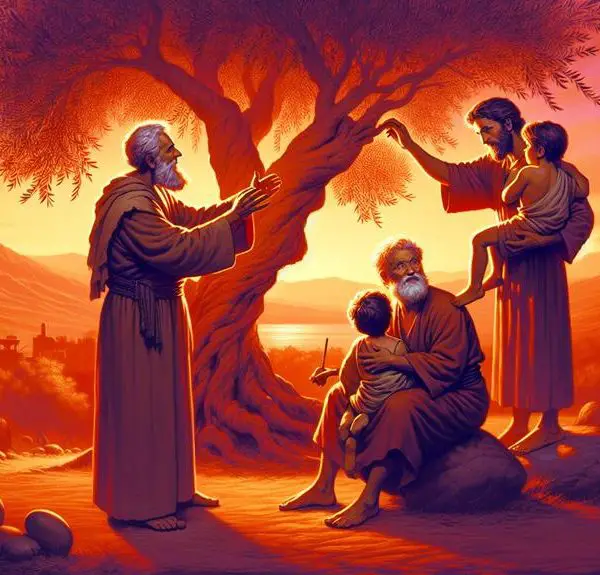
Sign up